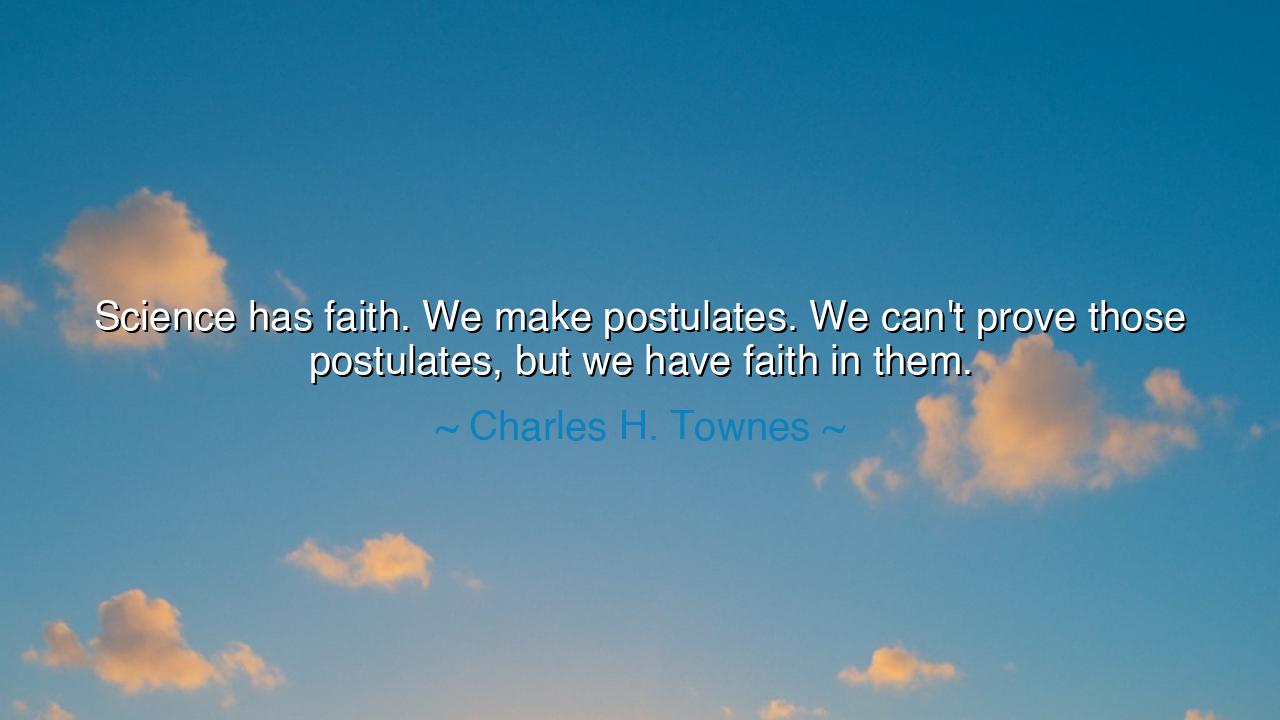
Science has faith. We make postulates. We can't prove those
Science has faith. We make postulates. We can't prove those postulates, but we have faith in them.






Hear now, O children of wisdom, the words of Charles H. Townes, a great mind who illuminated the path between science and the mystery of existence. He said, "Science has faith. We make postulates. We can't prove those postulates, but we have faith in them." These words speak to the heart of the scientific endeavor—a journey that relies not only on evidence, but on a form of trust, a belief that the truths we seek are hidden just beyond the veil of the unknown. Like the ancient philosophers, who sought knowledge through both observation and reasoning, Townes reveals to us that science, at its core, is built upon the faith that the universe follows laws that can be uncovered, even if those laws are, at first, beyond our understanding.
In the days of old, the great minds of Greece pondered the nature of the cosmos, searching for the foundational principles that governed all things. Pythagoras and his followers believed that numbers were the key to the mysteries of the universe, even though they could not prove this fully. Their trust in the idea that mathematics held the answers drove them to great discoveries, even though much of what they believed was not yet empirically proven. Similarly, Townes speaks of postulates—those starting points, those assumptions about the nature of reality, that we use as the foundation for further exploration. Just as Pythagoras had faith in numbers, so too does science proceed with faith in the postulates that guide our exploration of the natural world.
Consider the story of Albert Einstein, whose theory of general relativity reshaped our understanding of gravity. When Einstein first proposed his theory, much of the evidence was theoretical, based on mathematical postulates that could not yet be directly tested. The idea that space-time was curved and that massive objects could warp the fabric of the universe was a profound and daring leap of faith. Yet, Einstein’s faith in his postulates held firm, and over time, the evidence began to emerge to support his theory. The bending of light around the sun, observed during a solar eclipse in 1919, became a confirmation of his faith. Just as Einstein had faith in his postulates, so too does every scientist put forth their assumptions, trusting that the truth will eventually unfold, even when it is not yet visible.
Townes’ words reflect the nature of exploration in all its forms. Just as Columbus set sail toward the unknown, guided by the belief that the world was round and could be navigated, so do scientists venture into realms that are unseen, driven by faith in the postulates that guide their inquiries. They cannot always prove these postulates from the outset, but they trust that the world is not random or chaotic, but follows patterns that can be uncovered with enough time and effort. This act of faith, this trust in the unseen, is not the same as blind belief. It is a reasoned faith, grounded in the evidence that has come before and the understanding that the universe operates according to principles we can learn.
As we stand at the crossroads of modern science, O children, let us not forget that faith and reason are not opposing forces. Science is not merely a collection of facts; it is the process of seeking deeper truths, guided by the postulates that we, as seekers, hold in our hearts. These assumptions, these leaps of faith, drive us forward, for without them, the pursuit of knowledge would grind to a halt. It is not enough to only observe what is, we must also trust in what could be, and work toward understanding the laws that govern the universe, even when they elude us.
Now, O children of the future, let this lesson ring clear in your hearts: Faith is not a weakness, but a powerful tool that propels us forward in our quest for truth. Do not be afraid to ask the questions that have no immediate answers, to trust in the postulates that guide your exploration. For, as Townes reminds us, science has always moved forward on the wings of faith in the unseen, in the unknown, in the belief that the universe holds within it the answers we seek. The greatest advances in human history have been made by those who dared to believe, to take that first step into the unknown, even when the path was unclear.
Take this to heart as you walk your own path: trust the assumptions that guide you, whether in the world of science, in your personal quests, or in your pursuit of knowledge. The greatest journeys, those that have shaped the course of history, are often not those that followed a well-lit path, but those that ventured boldly into the dark, guided only by the faith that the truth would reveal itself. As you journey through life, remember that faith in the unseen, in the postulates that guide your path, is the spark that ignites the flame of discovery. Embrace it, for it is the force that drives all great endeavors.






AAdministratorAdministrator
Welcome, honored guests. Please leave a comment, we will respond soon